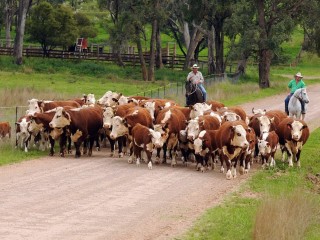 Upwards of 250 seedstock breeders across Australia will offer guaranteed freedom from Pestivirus this bull-selling season, as both vendors and buyers respond to the opportunity to verify disease-free cattle passing from the seedstock to commercial sectors.
Upwards of 250 seedstock breeders across Australia will offer guaranteed freedom from Pestivirus this bull-selling season, as both vendors and buyers respond to the opportunity to verify disease-free cattle passing from the seedstock to commercial sectors.
One of the main drivers of the trend is Pfizer Animal Health, which launched its PfizerSTAR program in mid-2009, providing a quality assurance based program to ensure animals are protected against several reproductive diseases.
In order to earn the PfizerSTAR logo, animals are tested to confirm they are not Persistently Infected (PI) with pestivirus, and then vaccinated with Pestigard. The program also includes vaccination with Ultravac 7-in-1 and Vibrovax, to provide protection against vibriosis and other reproductive diseases.
Early uptake by the seedstock industry of the program was slow, largely because of the lack of understanding around the broader cattle community of the implications of pestivirus (alternatively known as BVDV, or bovine viral diahorrea virus).
Since then, however, there has been ‘consistent, steady uptake’ of the program, as breed societies, show societies, and individual producers become more aware of the potential reproductive dangers associated with the spread of pestivirus in naïve herds.
Shorthorns early adopters
Pfizer’s program manager for Cattle Biologicals, Kirsty Thomson, said the Shorthorn Society had been a ‘very proactive’ early adopter in its approach to eradication of pestivirus, and making sure that all animals participating in the breed’s shows and sales were not put at risk.
“A lot of it is about risk. A breeder can take their PI-free tested animal to a show or sale, but if it has not been vaccinated first, then that animal is still at risk,” she said.
The Pfizer Star program was applied as a mandatory entry requirement at the Dubbo Dectomax National Shorthorn Show & Sale last month, and will apply to multi-vendor Shorthorn sales in future.
“A number of buyers I spoke to at Dubbo indicated that they had implemented pestivirus screening and protection programs in their own commercial herds, and they wanted to know that purchases made at the sale were PI-free and were not going to present a risk,” Ms Thomson said.
She said she had attended a stud sale last year where the vendor, explaining a withdrawal from his catalogue, nominated a PI-positive test result as the reason.
“Much of the mystery and stigma about the disease is now gone. He explained that he was now going through the process of identifying any possible carriers in his herd, and eliminating them.
But equally importantly, he was able to assure buyers that all other animals in the sale, tested and vaccinated, were pesti-free.”
Hereford Wodonga sales last year and again in 2011 offered full PfizerSTAR pestivirus protection, as did the Poll Hereford Dubbo sale this year.
Uptake is also growing in the private (single vendor) bull sale segment, across a range of breeds.
At this stage, that tends to be at the larger, more ‘professional’ end of the bull breeding industry, but adoption is now rapidly infiltrating down to smaller seedstock operations.
Not all breeders are using the multi-disease PfizerSTAR program, however. Some elect to test and vaccinate independently for pestivirus alone, although such programs are not protected by statutory declaration or audit.
Adoption rate grows in Indicus breeds
The testing/vaccination trend is also emerging among Indicus-infused breeds, which have so far been slower on the uptake. Tartrus/Lancefield Brahman sale implemented a protection guarantee program for the first time last year, and other Brahman breeders are following suit.
The first major northern multi-vendor sale to adopt screening and vaccination is the National Droughtmaster Sale to be held at Gracemere on September 13 and 14.
Droughtmaster Society chief executive Neil Donaldson said the sale committee proposed the test introduction earlier this year, and it was sanctioned by the breed’s board of directors.
This year’s catalogue will offer about 530 bulls – all pre-tested and vaccinated pesti-free. Vendors had the option to use either the original ear-notch test or the more recently introduced hair sample test to establish pesti status.
Asked how many, if any of the tested cattle had presented as pestivirus Persistently Infected (PI) positive, Mr Donaldson said it was impossible to tell, because vendors withdrawing catalogue nominations were not obliged to provide reasons.
“Withdrawals can came for any number of reasons – lameness, scrotal palpation or semen morphology test results for example, but statistically, it is likely that a small number of those withdrawals were because they were PI’s,” he said.
So what motivated National Droughtmaster Sale vendors to adopt the test, given that there is a cost involved?
“The sale committee felt that buyers today are looking for higher levels of quality assurance, and fitness for purpose guarantees,” Mr Donaldson said.
“It’s a competitive marketplace for bulls, and these days it’s important to be doing more than your competitors to meet buyer expectations. Times change, and seedstock breeders have to move with the times. If there’s an issue there, then we have to address it.”
Anecdotally, it is understood that there have been ‘three or four’ PI infection claims made against Central Queensland stud breeders (various breeds involved) over the past couple of years, by commercial bull buyers.
All were discretely resolved with settlements, without any public disclosure, but the fact remains that there is considerable financial risk attached to selling PI cattle under ‘suitability for purpose’ requirements.
